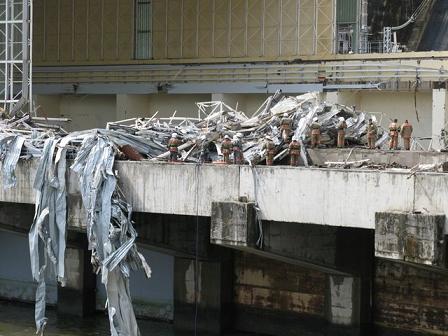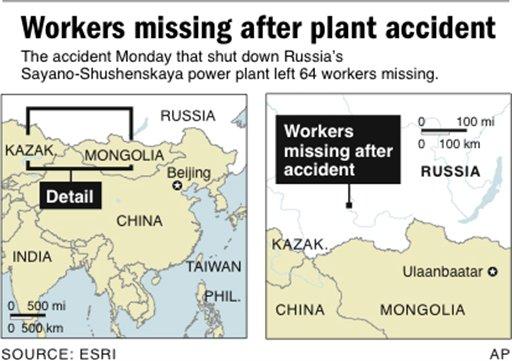
| |
 |
 The cause of this accident will never be known as the evidence is in pieces. It will
remain speculation, and because blaming a transformer that cannot be reassembled is the
easy way out, this will be the claimed cause. If the transformers had a "fault" that finally
proved fatal, it seems odd that it functioned for over 20 years, since the power station
was fully operational. Transformers take the motion from a flow of water, convert this
into a churning motion in an electromagnetic chamber to induce an electric current. If the
flow is too strong, the churn can be too rapid, and presumably this is the logic behind
blaming the explosion on a transformer fault. A rapidly turning turbine might overheat,
would be the logic. But there are built-in brakes in power stations, so that such a
runaway situation cannot occur. If there is too little water above the dam to meet the
needs in many forthcoming months, the force of water is very carefully controlled so as
not to waste water. What we are saying is that the force of water, the amount of water,
can be controled at many points, and diverted if runoff is needed so the dam does not
overtop. These controls are manual and automatic, with backup and overlap. Running a
power station of this size is not a casual operation.
The cause of this accident will never be known as the evidence is in pieces. It will
remain speculation, and because blaming a transformer that cannot be reassembled is the
easy way out, this will be the claimed cause. If the transformers had a "fault" that finally
proved fatal, it seems odd that it functioned for over 20 years, since the power station
was fully operational. Transformers take the motion from a flow of water, convert this
into a churning motion in an electromagnetic chamber to induce an electric current. If the
flow is too strong, the churn can be too rapid, and presumably this is the logic behind
blaming the explosion on a transformer fault. A rapidly turning turbine might overheat,
would be the logic. But there are built-in brakes in power stations, so that such a
runaway situation cannot occur. If there is too little water above the dam to meet the
needs in many forthcoming months, the force of water is very carefully controlled so as
not to waste water. What we are saying is that the force of water, the amount of water,
can be controled at many points, and diverted if runoff is needed so the dam does not
overtop. These controls are manual and automatic, with backup and overlap. Running a
power station of this size is not a casual operation.
Note the time of the explosion, 00:15 UTC. We have stated that one of the pressures on
Earth during the approach of Planet X is that the magnetic Atlantic Rift is hugged or held
when it faces the Sun and the approaching Planet X (which is coming toward Earth from the direction of the Sun). Magnets like to be in alignment, and Planet X is a
bully magnet. This tug was apparent in 2003 on the live seizmographs in a twice a day shudder, 12 hours apart. The first tug occurred when the Atlantic Rift faced
Planet X, at noon in Greenwich at 12:00 UTC and the second when it was on the dark side of the Earth, in opposition at 0:00 UTC. The Sayano-Shushenskaya
explosion occurred when the rift was at the dark side, and was caused by the magnetic fields of Earth and Planet X touching and clashing momentarily. Such a
situation was the warning in the recent August 10, 2009 Woodborough crop circle. Air France 447 went down over the Atlantic Rift during that same danger
period, when the Atlantic Rift is in opposition, due to almost total failure of its electronic systems.
Planet X is pointing its N Pole at the Earth, pushing the Earth's N Pole away for a violent Earth wobble each day. Until the Earth tips away into 3 days of darkness,
the magnetic field of Planet X is butting head-on into the side of the magnetic field of Earth, forming a T rather than a side-by-side alignment. While at the distance it
is, this tends to scatter the magnetic field of Earth at the touch point, to dissipate the magnetic crowding. This crowding can be shown in the blast of magnetic
particles that have been recorded periodically since January 21, 2009. There are harmonics that occur when two magnetic fields encounter each other. The fields
clash and divert the magneton flow temporarily if they cannot merge in an alignment. In the meantime the flow of magnetons can be moving in almost any direction.
When magnetic fields touch and clash, the crowding of magnetic particles that occurs at the touch point must go somewhere, and for the Earth, the push is a tsunami
toward the sides of the Earth, taking the path of least resistance.

The Sayano-Shushenskaya power plant is directly at the side of this magneton rush, at 00:15 UTC, where the tsunami of magnetons is pouring over the sides of the Earth, rushing to leave the crowding that at times occurs when the planetary magnetic fields clash. Unlike the blasts that have been registered since January 21, 2009, where it appears magnetons are washing over the Earth as a whole, the touch point wash-to-the-sides is a diversion of magnetons. This can be compared to a tsunami, which pushes the overabundance of water ahead of the wave, where the blasts can be compared to a high tide, where the water is in greater abundance throughout the area. The Sayano-Shushenskaya power plant encountered this tsunami, flowing over the sides of the Earth, and the transformers reacted. The electron motion produced by the transformer was excited, enhanced by the electromagnetic tsunami surging through the area. Parts of the system were automatically instructed to brake, while other parts assumed the flow of water churning the system to be appropriate. This caused heat to build up, and an explosion was the result.
- Sayano-Shushenskaya Hydroelectric Power Station
http://en.wikipedia.org/wiki/Sayano%E2%80%93Shushenskaya_hydroelectric_power_station- Construction of the power station started in 1968; the plant was opened in 1978. It was partially reconstructed in 1987. At 8:15 local time (00:15 GMT) on 17 August 2009, the station suffered a catastrophic "pressure surge". During repair work a sudden change in water pressure caused a water pipe to burst resulting a transformer explosion and flooding in the engine and turbines rooms. The cause of the accident is unclear. Defective turbines and a rise of pressure in the pipes are speculated to be possible causes. According to Alexander Toloshinov, a former general director of the plant, the accident was most likely due to a "manufacturing defect" in a turbine.
- 13 dead, 61 Feared Dead in Siberia Plant Explosion
August 19, 2009
http://www.google.com/hostednews/ap/article/ALeqM5iP8LEhWDkeRuNFgkFHV4E-oee6TAD9A5UU2O0- Energy Minister Sergei Shmatko described the accident as "the biggest and most mysterious in global hydroenergy" and said it would cost 40 billion rubles ($1.2 billion) to rebuild the power plant's engine room. The cause of the accident was still unclear. Officials and the plant's owner have cited a faulty turbine and a rise of pressure in the pipes as possible causes.